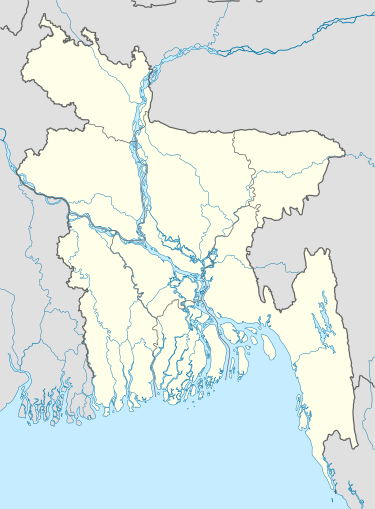Chhatak
| Chhatak | |
|---|---|
| Town | |
 Chhatak | |
| Coordinates: 25°2′N 91°40′E / 25.033°N 91.667°ECoordinates: 25°2′N 91°40′E / 25.033°N 91.667°E | |
| Country | Bangladesh |
| Division | Sylhet Division |
| District | Sunamganj |
| Upazila | Chhatak |
| Area | |
| • Total | 9.24 km2 (3.57 sq mi) |
| Population | |
| • Total | 34,498 |
| • Density | 3,700/km2 (9,700/sq mi) |
| Time zone | BST (UTC+6) |
Chhatak (formerly known as Chhatir Bazaar) (Pronounced 'Sa-thokh') is a town in northeastern Bangladesh, on the Surma River, Sunamganj district, Sylhet Division. It has a population of 34,498 and an area of 9.24 km². Chhatak expanded rapidly following the discovery of a natural gas field nearby in 1959. As well as the work generated in extracting gas, the town also has a number of industries powered by natural gas, including the largest cement plant in Bangladesh
Geography
Chhatak Upazila (Sunamganj district) with an area of 434.76 km2, is bordered by Dowarabazar Upazila to the north, Jagannathpur Upazila to the south, Companiganj, Sylhet Sadar Upazila, and Bishwanath Upazila to the east, Sunamganj Upazila to the west.
The area of Chhatak town has 9 wards and 22 mahallas. The main river that runs through the town is the river Surma, which is well connected with the rest of the country, as it flows from the Indian border at Karimganj through Sylhet into Chhatak, then to Sunamganj and to the capital, Dhaka. Although the town is served with a highway and railway, connecting the town with the rest of the country, the river is very much still an important way of transportation of goods as the road and rail aren't as reliable. The town has grown around the river, especially on the south side, as the town centre is located here and most of the its Industries. The river Surma is wider in Chhatak than in Sylhet, and can be used by cargo ships all year round unlike Sylhet which has its rivers drying up during the winter seasons due to silt travelling down the river from India. Chhatak is also in danger of its river drying up if it carries on silting up the rate it is at the moment. And also to add to the problem, India has decided to build a dam system upstream from Chhatak which will stop the flow of the water in the river hence, the silt fills the river up. On a clear day, the Khasi Hills in the Meghalaya state of India are clearly visible to the north giving the town a very scenic background with even the waterfalls are visible during the rainy season.
History
In 1908 Chhatak Police outpost was established and then further upgraded to a thana in 1922.
One of the oldest industrial units in the country, Chhatak Cement Company Ltd. was established in 1941. To raise production capacity from 135,000 tons to 233,000 tons, the 2nd phase of the expansion programme has been completed with financing from Asian Development Bank. The Factory uses limestone imported from Meghalaya, India and from its own quarry-Takerghat Limestone Mining Project. French multinational Lafarge Surma Cement Limited (LSCL) at Chhatak ($255 million state-of-the-art plant) has a capacity of producing 1.5 million tonnes of cement every year.
In 1959 Chhatak expanded rapidly following the discovery of a natural gas field nearby. As well as the work generated in extracting gas, the town also has a number of industries powered by natural gas, including the largest cement plant in Bangladesh.
The thana was turned into an upazila eventually in 1985.
Background
It is learnt that the area is very rich in producing oranges and lemons. Moreover, fruits such as oranges and lemons were brought here by boat from Jaintia Hills for sale in the local market. The boatman and passengers of the boats used umbrella meaning chata in Bengali to protect sun shine and rain. The market where fruits were sold is called chatar bazar. It is generally believed that the upazila might have derived its name as chhatak from the above word chhata.
Areas within Chhatak
- Hobipur/Habibpur (Village)
- Binodpur (Village)
- Buraya/Buraiya
- Boratuka (Village)
- Dharon (Village)
- Govindaganj (Urban Market)
- Gatpar/Ghatpar(Village)
- Haydor Pur/Haidarpur(Village)
- Jahidpur (Village)
- Jalalabad (Village in Chor Mohalla)
- Jawa Bazaar (Urban Market)
- Madhob Pur
- Khola Gaon (Village)
- Lakhom Shum (Village)
- Mahammedpur (Village)
- Moinpur (Village)
- Palpur (Village)
- SailaChhaila(Village)
- Shorisha Para (Village)
- Zia Pur (Village )
- Mondol Pur (Village)
References
- Hossain, Ashfaq (2012). "Chhatak Upazila". In Islam, Sirajul; Jamal, Ahmed A. Banglapedia: National Encyclopedia of Bangladesh (Second ed.). Asiatic Society of Bangladesh.
- Cement Americas
- News Report About Chhatak Gas Field http://banglapraxis.wordpress.com/2008/06/18/gas-field-blow-out-niko-sued-for-tk-746cr-over-tengratilla-loss/